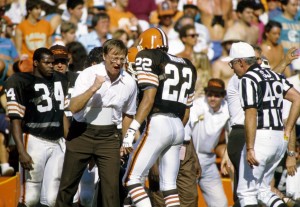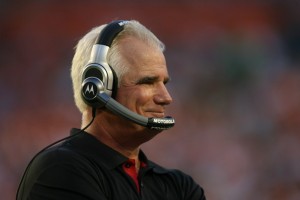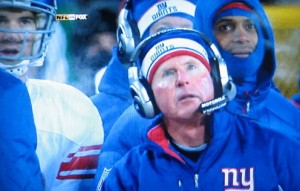With week 16 in the books, it’s time to take a look at the playoff picture. In the AFC, it’s simple: we know the six teams that will be in the post-season. In the NFC, there are two spots still remaining and five teams trying to claim them. In both conferences, there will be battles for byes in week 17.
AFC
The 12-3 Houston Texans are suddenly in a freefall, and could drop from the presumptive number one seed to having to win in the first round of the playoffs. If Houston loses in Indianapolis, the Texans are vulnerable to being caught by either Denver (home against Kansas City) or New England (home against Miami), or both. There’s likely no middle ground, since the Broncos and Patriots are big favorites, meaning it’s the #1 seed or no bye for Houston. Still, Houston is likely to get the top seed in the AFC. After all, the Colts did just struggle mightily to handle the worst team in the NFL.
Denver can secure a bye by beating Kansas City or having the Dolphins beat the Patriots, and would earn home field advantage throughout the playoffs with a win and a Colts victory. The likely result for Denver is the #2 seed
The Patriots are third in the pecking order with four losses. They could drop to the #4 seed with a loss and a Ravens victory over Cincinnati, but that doesn’t mean much: a home game against Indianapolis won’t scare New England and might even be an easier matchup than facing A.J. Green and Geno Atkins. The real drama is whether Denver or Houston falls, giving New England a chance for a bye or even home field. While the Patriots could end up being slotted from 1 to 4 in the AFC, expect each of the top three seeds to take care of business, and New England to finish as the #3 seed.

Pagano as defensive coordinator of the Ravens.
Because the Browns defeated the Bengals, the Ravens hold the tiebreaker over Cincinnati. Both teams split with Pittsburgh, and would split with each other if Cincinnati defeats Baltimore on Sunday, but Baltimore’s sweep of Cleveland would give them the division even if they lose to Cincinnati in week 17. Baltimore has little to play for in Cincinnati; the irony is that if Baltimore defeats the Bengals and the Patriots lose, the two teams would face off again in the first round of the playoffs in Baltimore. Still, the
likely scenario is Baltimore staying at the 4 seed and hosting the Colts in the first round of the playoffs.
The Colts are the feel good story of the year, and Chuck Pagano comes back to coach the team this weekend. It’s actually a meaningless game for Andrew Luck and the Colts on Sunday, as they can’t improve their playoff positioning. In fact, they can only hurt it: a victory over Houston in week 17 means, assuming the Patriots defeat the Bengals in the first round of the playoffs, that the Colts would face the Broncos instead of the Texans in the second round. In any event, we know that the Colts are the 5 seed and unless the Patriots lose and the Ravens win, will travel to their old stomping grounds in Baltimore in the first round of the playoffs. Expect that to be a very emotional game and for the Ravens crowd to give a warm #Chuckstrong welcome to their former defensive coordinator.
NFC
Matt Ryan and the Falcons have clinched the #1 seed in the NFC. For all the bashing Atlanta seems to take, they might end up winning three more games than any other team in the conference. However, the most likely opponent in the first round of the playoffs is Seattle, which would be a fascinating contrast in styles. The Falcons will face the winner of the 4/5 game or the 6 seed, but since the 6 seed will likely play in San Francisco, and the Seahawks look much better than either the Redskins or the Cowboys, my money is on Seattle-Atlanta in round two.

Brett Favre is honestly surprised the Packers haven't secured a bye yet.
in the conference. The NFC East winner is out, so the #2 seed comes down to either the Packers or the NFC West winner. Green Bay gets the #2 spot with a win, or with losses by both the Seahawks and 49ers. I wouldn’t count on that. Winning in Minnesota is not going to be easy —
Adrian Peterson will be chasing
Eric Dickerson’s rushing record and the Vikings are in a “win and you’re in” scenario themselves — but I’d still make
Aaron Rodgers and the Packers the favorites. If the Packers lose in Minnesota, their punishment is a first round visit from the Vikings.
San Francisco can still finish as the #2, #3, or #5 seeds. The 49ers get a bye if the Packers lose and the 49ers win, but more likely, San Francisco defeats Arizona and ends up as the #3 seed in the NFC. The 49ers could also get the #3 seed with a loss if the Seahawks lose at home against the Rams, but good luck with that. If San Francisco loses at home to Arizona, the 49ers will likely get what they deserve — the fifth seed and a trip to either Washington or Dallas in the first round of the playoffs.
The NFC East will be decided in Washington on Sunday. If the Redskins win, which would be my prediction, Washington will win the division at 10-6. The ‘Skins have another out, as they could get the 6 seed even if they lose to the Cowboys. At 9-7, Washington would have the tiebreaker over Minnesota based on head-to-head record, so if the Vikings and Bears lose to Green Bay and Detroit, Washington is in the playoffs. Assuming the Redskins make the post-season, Luck would be joined by fellow rookies Robert Griffin III and Russell Wilson in the playoffs, an NFL first.

TO taught Sherman what to do when you arrive at the Cowboys 50-yard line.
Meanwhile,
the Cowboys face your basic ‘win and you’re in’ scenario. At 8-8 they can’t make the playoffs, so it’s just a question of whether they can defeat the Redskins and claim the NFC East. The other interesting thing to keep an eye on:
Tony Romo is only 315 yards away from hitting the 5,000-yard mark, although he trails both
Drew Brees and
Matthew Stafford in the race for the passing crown.
By defeating San Francisco on Sunday night, the Seahawks clinched the #5 seed in the NFC. While the Bears and Vikings could get to 10 wins, Seattle defeated both teams, so Seattle’s fate is secure as no worse than the 5th seed and is rewarded with a trip to either Washington or Dallas in the first round of the playoffs.
That leaves just the sixth seed up for grabs. If the Vikings defeat the Packers, they’d get the #6 seed and likely travel to Lambeau Field in the first round of the playoffs. No word on whether Brett Favre would be in attendance. Minnesota has the tiebreaker over the Bears because Green Bay swept Chicago, while in this scenario, the Vikes would end up 4-2 in the division. Chicago therefore needs Minnesota to lose and to win in Detroit to get the #6 seed. If both teams lose, the Redskins then would slot into the 6 seed even if they lose.
You might notice we’re missing a certain team from New York. Well, the Jets have struggled this season, and the Mark Sanchez/Tim Tebow/Greg McElroy circus has only gotten more depressing. Oh wait, there’s another team in New York, right? Well, the Giants can’t win the division, but could get a wildcard berth. They would need the other teams they’d be battling for the final spot — Chicago, Minnesota, and Dallas — to lose to Detroit, Green Bay, and Washington, in addition to taking care of business against the Eagles. The longshot there would be the Lions defeating Chicago, but otherwise, it’s not a completely far-fetched scenario.


















